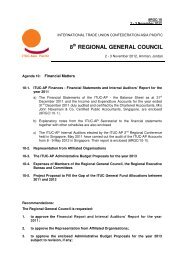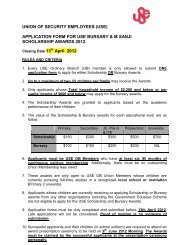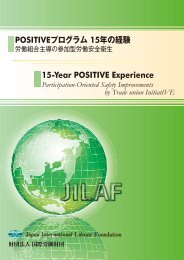BANGLADESH LABOUR LAW: - People Tree Foundation
BANGLADESH LABOUR LAW: - People Tree Foundation
BANGLADESH LABOUR LAW: - People Tree Foundation
You also want an ePaper? Increase the reach of your titles
YUMPU automatically turns print PDFs into web optimized ePapers that Google loves.
Limited freedom to express grievances, limited role of TUs and tripartite process. The<br />
opportunity for the workers to express their grievances at the workplace is severely<br />
limited. Disputes raised at the shop floor are solved mainly through informal discussion<br />
in both industries, presumably with the HR departments of the factories. The role of<br />
workers associations and tripartite body were mentioned by only a few garments workers.<br />
Inspection: “fire brigade” approach. Most workers said that they never met any<br />
government officials coming and inspecting their workplaces. Those who have visited<br />
their work places talked only to the employers. Also, inspections take place only after<br />
some accidents have occurred, like the fire brigade taking action after the fire.<br />
<br />
Access to judiciary: low awareness. Very few workers get the opportunity to take legal<br />
measures concerning conflicts with employers. They usually inform the police about such<br />
issue and a few take action through the workers association. A large numbers of workers<br />
(68.4 % in garments and64.5 % in construction) do not know whether they can take legal<br />
measures against their employers.<br />
GAPS and WEAKNESSES in the BLL<br />
From the foregoing research findings, it is clear that there are widespread violations of labour<br />
rights and labour laws in Bangladesh. Can these violations be cured by stricter enforcement?<br />
The answer is yes. But this is not enough because the BLL itself has some weaknesses. Below<br />
is a discussion of major gaps and weaknesses in the BLL identified by research team.<br />
Employment standards<br />
The BLL fails to include a large number of workers -- domestic workers, agriculture workers,<br />
and workers working at schools.<br />
The law has classified workers into several categories. This has given some employers flexibility<br />
to resort to the hiring of non-regular workers (i.e., apprentice, casual, badli, probationer,<br />
temporary) to escape payment of various workers benefits and avoid unionism.<br />
Worker dismissal is terribly easy under the provision on termination simplicitor, where the<br />
employer is not required to give any reason to terminate a worker and the worker is not given<br />
any chance for self-defense. Also, the notice period for the temporary workers in this regard is<br />
quite short.<br />
Getting financial benefit due to termination are quite lengthy too. For retrenchment and<br />
discharge, a worker must show proof of a minimum one-year service.<br />
Workers who resign from their jobs are entitled to certain separation benefits. However, getting<br />
these benefits is bureaucratic. The concerned worker is also asked to give the employer advance<br />
14
















